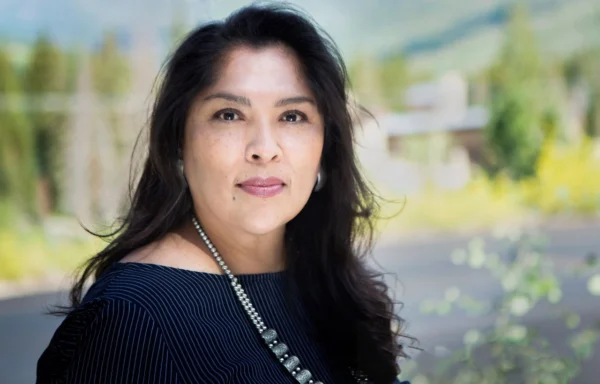Davina Smith is running as a Democrat to represent Utah’s House District 69. This is her second run for the seat, after an unsuccessful attempt to unseat incumbent Phil Lyman in 2022.
Davina, who is a member of the Diné (Navajo) tribe, currently is an independent Consulting Organizer and Tribal Coordinator to National Parks Conservation Association, a nonprofit organization devoted to protecting America’s national park lands. She describes her work as mostly acting as a liaison between different groups with interest in public land management.
As part of her policy platform, Davina is most focused on increasing opportunities to prosper in rural Utah, allocating more funding for education, promoting affordable housing, increasing resources for public safety, and repealing the sales tax on food.
Previously, she has focused attention on increasing awareness of Murdered and Missing Indigenous Women through the nonprofit organization Restoring Ancestral Winds, and advocating for land protection through the conservation nonprofit, Diné Bikéyah.
As a Native American, Davina’s life experiences have made her a unique candidate in the Democratic field. Much of what she discussed had to do with the needs of other Native Americans, especially those living in San Juan County. From that perspective, she always wondered who legislators were talking about when they talked about “the Utah people.” Does that include Natives? Does that include rural people?
“When we talk about our legislative issues up at the Capitol, I always hear that ‘we are advocating for our Utah people’,” she said. “Who are the Utah people?”
If that group actually included rural people, she argued, “We’d have top-notch education in our rural communities, we’d have affordable access to healthcare, we’d have economic growth and development. In my community, we’d have running water and electricity.”
In discussing competing issues between competing groups, Davina said that the divide isn’t between Whites and Natives, but rather, between urban and rural people. Governor Spencer Cox, who has focused on helping rural Utah, has missed the mark in Davina’s view. “You can only fully truly understand what our rural communities are going through [if] you’ve lived here,” she said.
Davina said one of the most important things the state can do to help rural Utah is improve the education system. She proposes to increase the number of teachers and to provide the equipment and curriculum the rural schools need.
Davina says another thing that will help the rural school systems is to promote more trade school involvement with local students. “I know there are trade school programs that would love to come down to connect with rural communities,” she said. Davina hopes that through promotion, trade schools can “collaborate with high schools or colleges, to implement some form of trade programs.”
As a Native and a conservationist, she disagrees with the narrative that the Natives are being used as “puppets” by conservation groups. She noted that she herself grew up ranching and grazing animals and has at times disagreed with the positions of environmental groups such as Southern Utah Wilderness Alliance.
Davina also discussed the concept of “responsible” grazing, which she is in favor of. She acknowledged that some areas have been overgrazed, but when pressed on whether the number of AUMs should be decreased, she declined to answer. For now, she is waiting to see the draft proposal of the Bears Ears RMP to make that determination.
Davina is in favor of President Obama’s creation of Bears Ears National Monument, especially because the proclamation promises to hear the input of tribal communities on land management policy. In her view, this has been a long-awaited moment when anybody was interested in hearing what Native people have to say on the subject.
Uranium mining and milling has also been a contentious subject in her region, especially for the Navajo. Her platform notes that pollution and water contamination from uranium tailings has been a serious problem for residents, but also acknowledges the economic need for jobs the industry brings.
When asked whether she supported the milling and mining of uranium in San Juan County, she stated that her priority is to “clean up sites that still have been abandoned.”
She is not in favor of new mining. “I have not been convinced… there’s nothing that has been done to ensure that these families are taken care of,” she said, speaking of cleaning up pollution from past mining activity.
Davina Smith hopes that with the help of her leadership, rural Utah can be more united. “I know that will not happen right away, but it’s something that I give that hope,” she said. For her, it’s about going out and listening to people “even in those difficult and tough and uncomfortable conversations.”
– The Byway
Feature image: Davina Smith.
Read more about this interview in The Byway Interviews Candidates for Utah House District 69.

